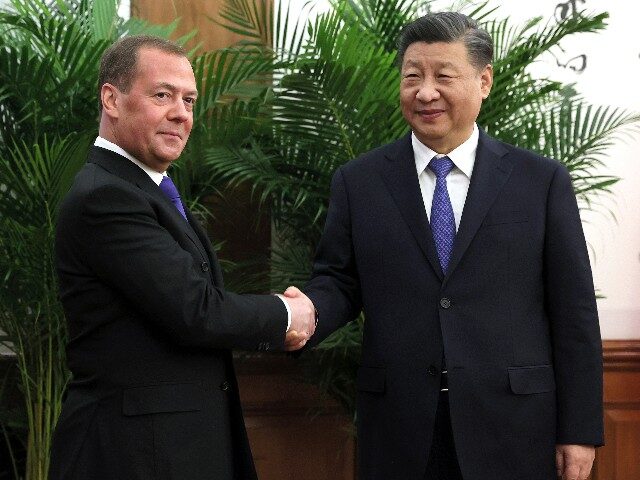Dmitry Medvedev, former president and prime minister of Russia and current nominal leader of the ruling United Russia party, met with Chinese dictator Xi Jinping in Beijing on Wednesday.
Russian state media portrayed the meeting as a delightful surprise that shored up Chinese support for Russia’s war and directly countered Ukrainian President Volodymyr Zelensky’s visit to Washington, D.C. Chinese state media, on the other hand, depicted a somewhat more reserved Xi telling Medvedev that China wants peace in Ukraine and advises all parties to exercise restraint.
Russia’s state news agency Tass was overwhelmed by the symmetry of Medvedev meeting with Xi at the same time Zelensky was securing billions in military aid from the United States, including its formidable Patriot missile defense system.
Tass quoted Russian analysts who accused Washington of using Zelensky to reboot American global hegemony while muscling Europe aside – as if the Europeans are chomping at the bit to take point in Ukraine if only Washington would let them! – and distract Americans from “domestic problems and scandals” with a manufactured “crusade against Russia.”
On the other hand, Tass found Medvedev’s visit to Beijing to be very intriguing:
The talks themselves at first seemed to be rather routine. The sides discussed the “strategic partnership”, “industrial cooperation” and “the broad similarity of approaches.” The most pressing question was why precisely Medvedev went to China. The expert community thinks that the key goal of the sudden meeting was Medvedev passing on a message from Russian President Vladimir Putin. And it seems like the Chinese leader also sent some message in response.
According to Director of the Moscow State University’s Asia and Africa Institute Alexey Maslov, it is precisely this message that was the key aspect of the Beijing meeting while Xi’s remarks on the Ukrainian conflict could be his response to the Russian president.
Tass waved aside Xi’s seeming lack of enthusiasm for Russia’s “special military operation” in Ukraine as merely words Xi was obliged to speak because China is in an “uncomfortable position” right now – its heart beating for Russia, but its head focused on big-ticket business deals and delicate diplomacy with the Western world.
Russian analysts told Tass that Medvedev was sent to Russia as an obvious stand-in for leader Vladimir Putin, who enjoys fervent support from United Russia but technically does not belong to it. Xi’s public remarks after the meeting were ostensibly his coded response to a “message” from Putin that was deftly delivered by Medvedev.
Besides the war in Ukraine, Putin’s message for Xi apparently focused on “the oil price cap introduced by the West.” This restriction was imposed in early December by the Group of Seven nations (G7) to limit Russia’s ability to finance its war against Ukraine by selling oil. Tass argued Russia and China should be brought closer together by their mutual antipathy toward the cap, given China’s growing dependence on Russian oil.
Another Tass article on Thursday celebrated joint naval maneuvers involving Russian and Chinese shops in the East China Sea from December 21-27 as a formidable sign of the combined military strength of the authoritarian regimes. The exercise was actually fairly modest in size, involving only half a dozen ships from each navy, although one of them was Russia’s Pacific Fleet flagship, the missile cruiser Varyag.
China’s state-run Global Times described the same meeting between Xi and Medvedev as a somewhat cooler affair, although it also touted the joint naval drills in the East China Sea as an important display of “mutual trust.”
In the telling of the Global Times, Xi praised China’s longstanding and growing strategic partnership with Russia, which Beijing sees as an axis of power that can topple nearly a century of American and European dominance, but Xi came up short of endorsing the Ukraine invasion, and Medvedev sounded defensive when the topic inevitably came up:
Regarding the Ukraine crisis, Xi said China decides its position and policy based on the merits of the matter concerned, upholds objectivity and fairness, and actively promotes peace talks.
Hopefully, relevant parties will remain rational and exercise restraint, carry out comprehensive dialogue, and address joint security concerns through political means, Xi remarked.
Medvedev said there are reasons for the Ukraine crisis, and it is very complicated. Russia is willing to solve the problems through peace talks, Xinhua News Agency reported.
According to the Global Times, the entire world is breathlessly waiting for China to take the lead on “peace talks to settle the Ukraine crisis” because Beijing understands Moscow’s thinking without reflexively taking its side.
“At least Russia can share its true feelings and thoughts on this issue with China. The Xi-Medvedev meeting will see if Russia and Ukraine’s willingness to talk things through can lead to actual progress effectively, and this echoes the common wishes of the international community,” Cui Hongjian of the China Institute of International Studies said.
“China’s stance on the Ukraine crisis has always been clear and its position is more flexible, as China is not directly involved in the conflict as the West is. What’s more, whether in terms of credibility or capability, the West cannot play the role that China could,” Cui added.

COMMENTS
Please let us know if you're having issues with commenting.